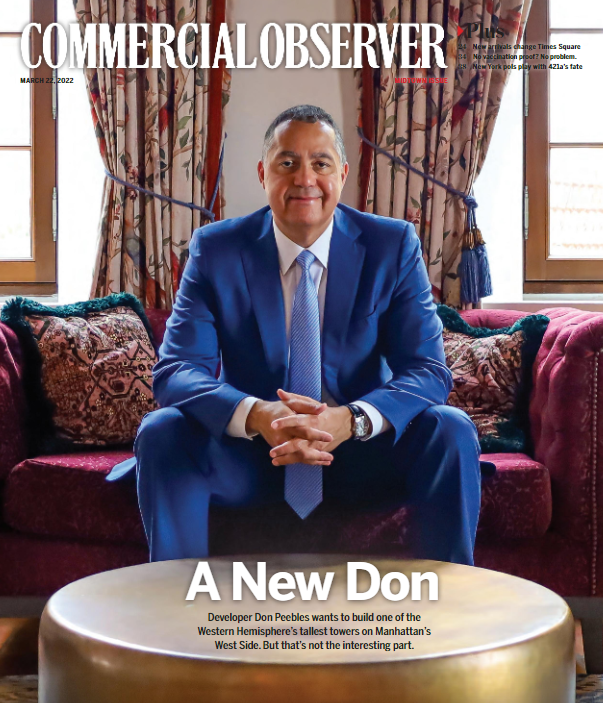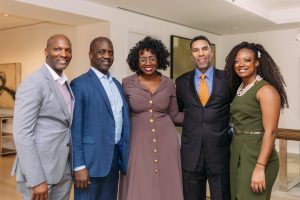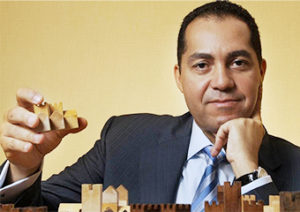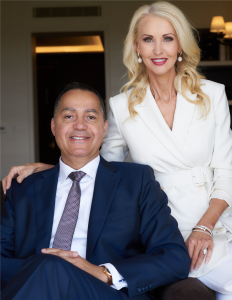
Read more in the Commercial Observer.
By Matthew Arrojas
The club was founded in 1926 on land that was previously an avocado plantation.
The Bath Club in Miami Beach will reopen later this month after an extensive renovation project.
Don Peebles, owner of the nearly 100-year-old private club at 5937 Collins Ave. in Miami Beach, updated much of the private club's members-only amenities. Allison Antrobus and Ruby Ramirez of Miami-based design studio Antrobus + Ramirez redesigned the property for Coral Gables-based the Peebles Corp.
The Bath Club features a three-acre private beach, a full-service spa, a fitness studio, a resort-style pool, cabanas, clay tennis courts, lounge areas and new culinary options. The private club also has six different venues providing a combined 26,000 square feet of potential event space for members.
Apicii Hospitality, a New York-based hospitality management and consulting firm, curated the Bath Club's new food and beverage options. Dining venues include the club's Courtyard, Veranda and the historic Parlor and Governor's Loggia. The restaurant and bars will serve seasonal Mediterranean-style menus.
Chef Jeff Masanz will serve as executive chef for the club. His experience comes from working in the industry at the Boca Raton Club & Resort and Diplomat Beach Resort.
According to a statement regarding the opening, the Bath Club is the only private club in Miami Beach not attached to a resort or hotel.
The club was founded in 1926 on land that was previously an avocado plantation. Over the years, it became a destination for notable figures including former President Herbert Hoover, William Vanderbilt II of the prominent Vanderbilt family, French jeweler Pierre Cartier and Boeing Co. founder William Boeing.
However, for years the club denied membership to Black and Jewish people. Peebles, the club's first Black member, purchased the property in 1999 with the intention to make the club a more inclusive experience.
“The Bath Club offers a sense of place, legacy and authenticity for all walks of life,” Peebles said in a statement. “This is where diversity and reinvention – past and future – come together for enriching experiences surrounded by privacy and luxury.”
Adjacent to the Bath Club stands the Residences at the Bath Club at 5959 Collins Ave. The condo building includes 112 units and was built in 2005.
Credit: South Florida Business Journal

R. Donahue Peebles Jr., Katrina Peebles and R. Donahue Peebles III hosted a spectacular Kick Off party with The New York Real Estate Chamber at their private residence in New York City. The New York Real Estate Chamber (NYREC) is a chamber of commerce comprising well-established residential and commercial developers, community development corporations, general contractors and property managers that share a common goal—the expansion of minority business participation and community development.

Notable attendees included: R. Donahue Peebles Jr., Katrina Peebles, R. Donahue Peebles III, Andrew Cooke, Tywan Anthony, Thomas Campbell, Paul Moore, Joshua Anthony, Randall Toure, Craig Livingston, Devon Prioleau, Meredith Marshall, Andy Jee, Chris Bramwell, William Wilkins, Nicole Lockett, Osei Rubie, Cheryl Daniel, Brian Benjamin, Harry Haynes, Jerrod Delaine, Kenneth Morrison, Darrel Gay, Derrick Lovett, Gordon Bell, Manuel Burgos, Eboni Harris, Francilia W. Rahim, Dwayne Jeffrey, Dawanna Williams, Gardner Rivera, Joe Ballaris, Timothy Edwards, Randall Powell, Roland Powell Jr., Donald Matheson, Micheal Bunton, Victor Amoo, Josie Francis, Marina Ovanesyan, and Salud Reyes.

The party served as a kickoff to The Emerging Leaders and Markets (ELM) Conference. The ELM is the New York Real Estate Chamber’s signature event, bringing together leaders from Government, Business, Community Development and Finance to enlighten attendees with regard to current opportunities and innovations in a series of topical panels. The conference will convene at Columbia University’s Faculty House, March, 2020. The New York Real Estate Chamber (NYREC) expects ELM to attract 300 commercial and housing real estate professionals, along with political and community leaders from throughout the Tri-State Area. ELM will feature some of real estate’s most successful and innovative deal makers and leaders of minority-owned firms and just as important leading public policy makers, to drive the discourse, develop ideas, and relationships around sustainable development in urban communities. The ELM Conference is a uniquely powerful opportunity to connect with dynamic developers, government officials, financiers and other real estate professionals engaged in remaking the urban landscape.






Photo Credit: Monnelle Photography
Article available here MGMT Mann Report Management

Don Peebles spends an hour talking with Shaun Osher about his upbringing, his ability to turn big dreams into real possibilities, the evolution of the housing market and what success means to him in 2020.

Artist's rendering of the Members' Cafe at The Bath Club THE BATH CLUB
When it opened in 1928, the Bath Club— then the first and only private oceanfront club on Miami Beach—was built by and for people with pedigreed names like Firestone, Fisher, Vanderbilt, Boeing and Cartier. Designed by famed architect Robert A. Taylor in the popular Mediterranean Revival style of the day, it was created as an exclusive winter getaway, where wealthy Northeasterners could gather to socialize, swim and warm their bones— and neither locals, African Americans nor Jews were allowed access. More than 90 years later, a reincarnated version of the club will reopen this month—again to an elite set of members. But this time around, it will embrace a diverse crowd of every color and creed from every walk of life. The idea, says Don Peebles, the new club’s visionary and developer, is to flip the original founders’ premise on its head and transform it into a setting that he calls “exclusively inclusive.”
In its Roaring Twenties heyday, the Bath Club was an emblem of the Jazz Age, with cocktails flowing and fine food served while an eight-piece orchestra filled the air with music against a bougainvillea-draped tropical backdrop. Several decades later, Peebles, a high-profile South Florida developer, was invited to become the club’s first African American member and socialized there until he bought the property in 1999 after responding to a request for a proposal to redevelop the property. “The opportunity to own and develop prime oceanfront land in one of the most coveted areas of Miami Beach was certainly a draw, but as a member of the club, I had a personal connection to the project,” says Peebles. “I felt as though it was my duty to preserve the club’s history, while guiding it into its future. For me, it was a chance to make a statement as to how far Miami and the U.S. had come.”
And 20 years later, he’s done just that. With a complete interior revamp by female design duo Antrobus+Ramirez, the revitalized heritage property pays homage to its glory days with the best of its original architecture—stuccoed walls, cast-iron chandeliers, terra-cotta roof tiles and floors, and Prohibition-era secret doors—restored and left intact. Yet, now filled with a spirited mix of retro- inspired furnishings and accents, including fringed umbrellas, floral-patterned fabrics and canopies, tented cabana ceilings, plush banquettes, cozy leather chairs, rattan beach loungers and bar carts, it also offers a fresh take on old-school Miami glamour that coolly repositions it for the future. One of the designers’ favorite spaces in the 26,000-plus- square-foot facility is the private dining room. “Originally designed to be the jewelry box of the club, the insular room is the perfect place to create an element of surprise,” says designer Ruby Ramirez.
As in the past, food, drink and unparalleled service are central to the club’s offerings, though today a new menu of light, healthy fare developed by the acclaimed hospitality group Apicii will redefine the club’s array of dining experiences in the canopied outdoor courtyard and adjacent enclosed lounge as well as the indoor and outdoor dining areas near the pool, with butler service available at the multiple poolside cabanas. Many of the sporting and fitness activities, including swimming and tennis on the club’s refurbished clay courts, also derive from a page in the club’s original playbook, yet they’re now coupled with a roster of curated fitness programs delivered by the city’s top instructors, while customized private massages and skin treatments offer up-to-the-minute wellness options at the updated spa. And a wide range of events and programming—from film screenings, local artists’ exhibitions and music performances to cooking and mindfulness classes—will regularly take place in the club’s special events and ballroom spaces.
“What we need in today’s era is a place where bibliophiles, investment bankers, families, artists, DJs— people from all walks of life—can come together and enjoy the exclusivity and elegance that they crave in a space that is iconic in its own way and insulated from the everyday intensity of Miami,” says Peebles.
But make no mistake: While the club will cater to a new breed of elite members, it will remain ultraexclusive. Membership is offered by invitation only and limited to just 200 members and their families. The city’s only private beach club without an attached hotel component, the Bath Club’s superintimate environs along with more than 550 linear feet of oceanfront beach are but a few of the essential ingredients that set it apart from other private clubs on the Beach.
“The Bath Club is more mature, sophisticated and established,” says Peebles. “It was the first social club in the Southeast, so there is a certain level of history and prestige that other membership clubs simply cannot replicate.”

The Peebles Corporation’s (“TPC”) announced that Donahue Peebles, III has been appointed Chief of Staff. After serving as a member of the company’s Development Team for seven years – starting as an Assistant Project Coordinator and later promoted to the Development Executive role – Donahue will now work alongside his father, Don Peebles, Jr., advising on high-level initiatives and leading company-wide initiatives.
Donahue’s first role was at the Corporation’s New York office in 2013 before moving to Washington DC to reopen the branch. Donahue’s promotion to Chief of Staff comes after leading several development projects across TPC’s national platform, negotiating multiple commercial real estate loans, leading various financing efforts in addition to the launch of their affordable housing vertical. Donahue is the youngest recipient in Washington, DC history to win a Housing Production Trust Fund Grant and in his new role, will be streamlining the decision-making process as the company moves forward in the development of multi-billion dollar projects in Boston, New York City, Philadelphia, Washington DC, Charlotte, Miami and Los Angeles.
“Being appointed Chief of Staff of The Peebles Corporation is the opportunity of a lifetime and a true honor,” said Donahue Peebles, III. “Being able to learn and work alongside an incredibly talented team, as well as my father, has been extremely motivating. I look forward to taking on this senior role and am excited to help push the company into its next phase.”
Founded in 1983 by Don Peebles, Jr., The Peebles Corporation has become an industry leader with a portfolio of active and completed developments totaling more than 10 million square feet and $8 billion in the gateway cities of New York, Boston, Philadelphia, Washington D.C., Charlotte, Miami, San Francisco, and Los Angeles. TPC has successfully realized amongst the most real estate development through Public-Private Partnerships. Through construction excellence, sustainable materials, historic preservation and innovative design, every project is strategically selected to achieve transformative results for the company and community. Over the course of more than 35 years, The Peebles Corporation has developed high profile assets guided by the principles of Affirmative Development™ to empower women and minorities and close the wealth gap.
“This is an important opportunity for Donahue as he continues to grow as a leader of our family business,” said Don Peebles, Jr., Donahue’s father and Founder of The Peebles Corporation. “This promotion provides the opportunity for Donahue to demonstrate skills beyond the technical mastery of the development process and cross over into the more intangible aspects of real estate development. He is more than qualified for the position and I look forward to watching him take this next step.”
A graduate of Colombia University, Donahue has taken on numerous leadership positions and community service activations, from serving as a member of the Downtown BID to volunteering for Best Buddies and more. The Peebles Corporation is making a substantial bet on the next generation and will undoubtedly become heavier users of sequence post-nominal abbreviations for clarity.
About The Peebles Corporation
The Peebles Corporation is a privately held national real estate investment and development company specializing in residential, hospitality, retail and mixed-use commercial properties. The company has corporate offices in New York City, Miami, and Washington D.C.
Founded in 1983 by Don Peebles, the company has become an industry leader with a portfolio of active and completed developments totaling more than 10 million square feet and $8 billion in the gateway cities of New York, Boston, Philadelphia, Washington D.C., Charlotte, Miami, San Francisco, and Los Angeles.
Peebles is an industry leader in large scale real estate development through Public-Private Partnerships. Through construction excellence, sustainable practices, historic preservation and innovative design, every project is strategically selected to achieve transformative results for the company and community.
Over the course of more than 35 years, The Peebles Corporation has developed high profile assets guided by the principles of Affirmative Development™ to help empower women and minorities and close the wealth gap.
View article from Social Life Magazine

Don Peebles speaks with Dottie Herman about his start in the industry, working hard, loving what he does and his new fund to bring diversity to real estate and provide access to capital for women and minorities.

Artist's rendering of the lush courtyard The Bath Club
The Bath Club Miami Beach was founded in 1926 as a members-only gathering place where wealthy scions, celebrities and other influentials could meet over lunch, swimming and tennis. Chartered by the State of Florida, it was the first private social club in the Southeast, developed on the site of a one-time avocado plantation.
Apropos of societal and cultural changes that took place over subsequent decades, Roy Donahue (Don) Peebles became the club’s first African American member in 1996. A few years later, the visionary developer purchased the property and then added a 107-unit luxury condo tower and six elegant villas on the site.
It’s likely that none of the founders could have imagined that Peebles would one day own that property and transform it into an “exclusively inclusive” club that welcomed members of all ethnicities, cultures and lifestyles.
But meet Don Peebles, an entrepreneur with a strong social conscience and extraordinary commitment to diversity. Peebles is the founder and chairman of The Peebles Corporation, a multibillion-dollar venture that is the largest black-owned real estate development company in the U.S.—with projects in New York, Boston, Philadelphia, Washington D.C., Charlotte, San Francisco, and Los Angeles, as well as the one at The Bath Club in Miami.
He is also an author, popular keynote speaker, and regular guest on CNN, CNBC and FOX, addressing educational, business and professional issues. He has served on the National Finance Committee of President Barack Obama, on the Board of the Greater Miami Convention and Visitors Bureau and is the former Chairman of the Congressional Black Caucus Foundation.
Forbes.com spoke to Mr. Peebles about his plans to transform the historic Bath Club to a modern private club and open up its membership:
As a real estate entrepreneur, how, when and why did you get involved with the property?Don Peebles: I responded to an international Request for Proposal (RFP) and was ultimately the chosen responder within the competition. They liked my vision for the Club. The opportunity to develop directly on the ocean in this most coveted part of Miami Beach is enough for any developer to be interested but to be able to create some balance where it was once denied was incredibly motivating.
Given the Club’s discriminatory history, it was a chance to make a statement as to how far Miami and America had come. My commitment to the preservation of the clubhouse, keeping it as a venue and allowing original members access, was just one more reason I was chosen.
As the first African American member of the Club, what did the purchase mean to you personally?
DP: You know, I didn’t even know that I was the first African American member until I received a phone call from the Miami Herald after I had joined. To be a part of the history of an institution like this and being afforded the opportunity to be the catalyst for transforming it was motivating.
Since the beginning of my career, every project I have ever pursued was fueled by a passion for positive change—creating inclusion, which will give rise to a balance. My company engages in “affirmative development™” and this is the main vehicle through which we mandate ourselves to engage a minimum of 30% contracting on all our projects with Minority and Women-Owned Businesses.
This is not only socially effective but financially effective, as well…we call it “doing well by doing good.” In today’s world, people are demanding corporations do more than just make money. Businesses with an eye to the future would do well to begin to elevate their goals of inclusion and diversity. As a 100% minority-owned company, my wife and I have personally committed to relaunching The Bath Club. When we sat down and talked about how to reimagine this Club, while keeping its historical roots and bringing it into the 21st century, we knew these principles would be our guide.
Exactly where is The Club located?
DP: The Club is beachfront on the Atlantic Ocean on Collins Avenue in a historic district of Miami Beach. Its location is ideal for locals, travelers and annual visitors looking to explore the luxe and more refined Miami lifestyle, to enjoy stellar oceanside service, and to escape from the cold weather.
What are your goals for its reinvention?
DP: To bring our “affirmative development™” vision to life, we brought on the very talented female, minority-owned firm Antrobus + Ramirez, for the redesign. Luxury is increasingly aligned with legacy, history and authenticity–things that never go out of style and are appreciated more as time goes by. Our goal is to keep a sense of history embedded in the property while modernizing it to fit in today’s world.
What type of traveler would the new Bath Club appeal to? How do you anticipate members will use the club?
DP: The Bath Club is a members-only club that seeks to foster the idea of “Exclusively Inclusive.” Membership isn’t based on wealth or status. The Club will appeal to individuals who want a place that feels like home on Miami Beach. We will be accepting only 200 memberships for this coveted experience.
Sophisticated travelers looking to experience the best of what Miami life has to offer will find themselves right at home. We have created a historic space akin to an estate on the ocean. With a relaxed and inviting atmosphere in mind, we have provided many common areas within the property for 200 members and their guests to mingle, relax and host events.
We intend for this to be a “home away from home,” a place that our members can enjoy all day and well into the evening feeling at home. Family events will include: sports lessons, Sunday barbecues, outdoor movies and guest lectures with the club offering places to dine, relax, read, sun, work and play—with all the services to make these choices effortless. Ultimately, it will be a place for Miami’s residents, but also welcoming to celebrities and affluent travelers who want high-quality service.
What competition does the Club have in southern Florida?
DP: In terms of a private club, the Bath Club is peerless. Vizcaya Museum and Gardens (formerly called Villa Vizcaya) is a competitive and authentic event venue, but it is not a private club nor is it located on a huge beachfront. Some newer hotel-affiliated beach clubs do exist but they’re also a totally different experience; they’re not the same at all. A historic and authentic private beach club capped at only 200 memberships is an entirely unparalleled experience.
Can you describe the Club in terms of its amenities, ground, services, etc.?
DP: Members and their guests can enjoy exclusive access to our beach and pool with complimentary chaise lounges, umbrellas, towels and daily cabana rental. We have spa services as well as a fitness center and two clay tennis courts plus curated wellness programs which include yoga, meditation, cooking classes and more. We offer perks for the whole family including kids’ programs with babysitting, special event discounts, access to private members-only events, full-day programming and much more!
What type of cuisine/dining experience is planned?
We’re in the midst of putting the finishing touches on the dining experience at The Bath Club. The menu for our Poolside Restaurant & Bar will be curated by Apicii Hospitality.
When is the launch planned and how can people learn more?
Our official launch is fast-approaching and set to take place in early 2020. Potential members can request more information by emailing: membership@thebathclub.com/
Developer Don Peebles remembered launching sales for beachside condos he built after the turn of the century. Marketing Miami Beach meant "sex appeal and sizzle," he recalled in a phone call with Bisnow last week. "That meant objectifying women."
Consciously, he sought to counter the status quo by promoting a family-oriented vibe and hiring an all-women sales team.
These days, Peebles is relaunching the Bath Club, a Miami Beach institution that dates to 1927, as a private country club. Peebles said it will be a "more mature Soho House," and likewise targeted to families.
Peebles is struck by how lopsided the real estate industry is, even in 2019. Nearly all of his development deals are made with white males, he said. Is he a feminist?
"Yes!" Peebles said. "Men can and should be.
"Women are 65% of the real estate agents in the country," he continued. "However, they make up less than 5% of the people who are running the business. It's astonishing. In commercial real estate, you have to look hard to find any kind of gender diversity. That follows capital, to a large degree. You have $69 trillion of capital in hedge funds and private equity in real estate globally. Of that, 1.3% is invested in firms managed by women or people of color. In this country alone, women get less than 1 percent of private equity dollars invested in real estate. Minorities get less than half a percent."
The Peebles Corp. is a partner in $4.5B worth of projects around the country: a project in Manhattan's Tribeca neighborhood under construction, and in design/permitting/entitlement phases, a condo in Boston, two towers in downtown LA and an "urban village" in Charlotte, North Carolina. Peebles' company tagline is "affirmative development." The company ensures that at least 35% of its contractors, from lawyers to planners to architects, are women or minorities, Peebles said.
"The [International Council of Shopping Centers] conference in Las Vegas — women in the brokerage business won't go, or they're all uncomfortable," Peebles said. "All the social activities are women dancing on tables, or they go to a strip club."
At a recent real estate conference in Miami, Peebles said, "One of the exhibitors had 12 women in bikinis and high heels walking around the exhibit hall marketing their product. To professionals!"
Peebles said he is also raising a $500M private equity fund for urban infill, affordable housing projects in eight markets. He hopes to deploy that by the end of next year, ensuring funds largely benefit women and minority entrepreneurs.
Peebles sees the problem as systemic: At the institutions that invest from public pension or retirement funds — even though many of the workers contributing to those very funds are largely women and minorities — money managers tend to invest into proven entities seen as low-risk: established firms, which skew white and male.
"The system self-perpetuates. It overvalues prior experience," Peebles said. Furthermore, he said, pension fund money is often "used by developers to gentrify the communities where the workers live. It's like your own money being used against you ... People don't know how our financial system works."
Largely because of his concern about the wealth gap, Peebles two years ago considered a run for mayor of New York — "I may do that at some point," he maintains — but for now, he's sticking to business to effect change. He hopes his fund will prove that investing in diverse businesses pays off.
As for the Bath Club, it had been established as a private country club in the 1920s on a onetime avocado plantation. When Peebles moved to Miami in the 1990s, Arquitectonica co-founder Laurinda Spear suggested he join, he said. Only when a Miami Herald reporter called to ask how he felt being the club's first African American member did he realize that the club hadn't accepted black people or Jews, he said.
Peebles bought the club a few years later and transformed it, adding residences to the property in the form of a 107-unit condo tower and six multimillion-dollar villas in the early 2000s. Basketball star Dwyane Wade and Kelly Rowland from Destiny's Child each lived there at various points, Peebles said.
The private club continues to operate, and can be rented for special events like weddings. But a few years ago, Peebles bought out all the members with an eye toward a refresh. The Bath Club is currently getting new interiors and exteriors and will have butler services, a spa, a ballroom and wellness programming. Apicii will develop and operate restaurant and bar concepts. It is expected to reopen in February.
"It will be a more mature, more established Soho House," Peebles said, highlighting amenities for people with kids, including a pool, clay tennis courts and 550 feet of ocean frontage. He envisions sports lessons, Sunday barbecues, outdoor movies and guest lecturers.
He said it is ideal for people who live in Miami's affluent, but not beachfront, communities, such as Coral Gables or Coconut Grove. It would also be welcoming for celebrities or business people who want high-quality service from concessions and don't want to be photographed, as they might on public beaches. Membership would be by invitation only, limited to about 200, and cost about $15K per year.
And yes, Peebles was sure to use a female, minority-owned firm in the redesign: Miami-based Antrobus + Ramirez, whose proprietors, Alison Antrobus and Ruby Ramirez, have Caribbean and Southeast Asian ancestry. Photos show they bucked the minimalist, bright-white aesthetic that's ever-present in Miami, instead opting for lush decor, patterns and textiles.
"They're based in Miami. We wanted to give them an opportunity to showcase their work in their hometown," Peebles said. By being thusly attuned to hiring, he said, Peebles Corp. is "setting the tone."
https://www.bisnow.com/south-florida/news/commercial-real-estate/peebles-bath-club-miami-101539

Company: The Peebles Corporation
Industry: Real Estate
Don Peebles is Founder, Chairman and CEO of The Peebles Corporation, one of the country’s few privately held national real estate investment and development companies. Peebles’ multibillion-dollar portfolio includes projects across top U.S. markets. With his latest endeavor, The Bath Club, he became the first African-American member and went on to later owning, currently undergoing a major revamp to become Miami’s “exclusively inclusive” membership club. Katrina L. Peebles is responsible for the creative vision and direction of The Peebles Corporation’s design and marketing. For over 25 years, she has led the company’s efforts in the areas of real estate, interior design, historic preservation, community involvement and political fundraising.
NEW YORK
BOSTON
WASHINGTON, DC
CHARLOTTE
ATLANTA
MIAMI BEACH
SAN FRANCISCO